冠词知识点讲解
常用冠词知识点归纳总结

常用冠词知识点归纳总结一、基本概念1.1 定冠词(the)定冠词“the”用于特指某一事物或概念,表示“那个、那个”之义。
例如:the boy(那个男孩)、the book(那本书)等。
1.2 不定冠词(a/an)不定冠词“a/an”用于泛指某一事物或概念,表示“一个、一本”之义。
其中“a”用于辅音开头的词前,而“an”用于元音开头的词前。
例如:a book(一本书)、an apple(一个苹果)等。
二、用法2.1 定冠词的使用(1)用于指示唯一的事物或概念。
例如:the sun(太阳)、the earth(地球)等。
(2)用于特指前面提到过的事物或概念。
例如:I have a cat. The cat is black and white.(我有一只猫。
那只猫是黑白色的。
)(3)用于特指某一类事物或概念。
例如:The tiger is a wild animal.(老虎是一种野生动物。
)(4)用于特指世界上唯一的事物或概念。
例如:the sun(太阳)、the moon(月亮)等。
(5)用于特指唯一一处地点。
例如:the library(图书馆)、the hospital(医院)等。
2.2 不定冠词的使用(1)用于表示泛指的事物或概念。
例如:I want to buy a book.(我想买一本书。
)(2)用于表示数量为一个的事物或概念。
例如:I saw an elephant in the zoo.(我在动物园看到了一头大象。
)(3)用于表示职业、宗教信仰、国籍或种族等身份的特指。
例如:She is a doctor.(她是一名医生。
)三、常见错误3.1 定冠词和不定冠词的混用有些学生容易混用定冠词和不定冠词,导致语法错误。
例如:he is a boy. The boy is a student.(他是一个男孩。
那个男孩是一个学生。
)在这个句子中,第一个句子中应该使用冠词“a”表示泛指,而第二个句子使用冠词“the”表示特指。
冠词总结知识点归纳高中

冠词总结知识点归纳高中一、冠词的基本概念1. 冠词的定义冠词是一种语法范畴,用来表示名词的特指程度和表达名词的数量。
英语中的冠词主要分为定冠词和不定冠词两种。
定冠词包括“the”,不定冠词包括“a”和“an”。
2. 冠词的分类(1)定冠词:the(2)不定冠词:a,an二、定冠词的用法1. 特指一类事物“the”用于特指一类事物或某一人,表示上下文中所指的人或物。
2. 特指具体的事物“the”还可以用来指示上下文中已经具体说明或者双方都知道的人或物。
3. 特指独一无二的事物用于特指那些在特定范围中独一无二的事物,如太阳、月亮、地球等。
4. 特指自然界中的某一事物用于特指自然界中的某一事物,如天空、太阳等。
5. 特指宇宙中的某一事物用于特指宇宙中的某一事物,如“the sun”(太阳)、“the moon”(月亮)等。
6. 特指某一时间点用于特指某一时间点,如“the morning”(早上)、“the afternoon”(下午)等。
7. 特指某一地点用于特指某一地点,如“the school”(学校)、“the hospital”(医院)等。
三、不定冠词的用法1. 表示数量,修饰单数名词“a”和“an”用于表示数量的不确定性,修饰单数名词。
2. 泛指一类事物“a”和“an”还可以用于泛指一类事物,表示任何一个、一种、一些。
3. 表示重复出现的动作用于表示重复出现的动作,如“once a week”(一周一次)、“twice a month”(一个月两次)等。
四、特殊情况下的冠词用法1. 特指两者中的一个在表示两者中的一个时,用“the”表示特指。
2. 特指某个人的职业或身份当表示某个人的职业或身份时,也需要使用“the”。
3. 修饰序数词在修饰序数词时,需要使用“the”,如“I am the first one to arrive”(我是第一个到达的人)。
4. 表示特定类别的人群用于表示特定类别的人群时,需要使用“the”,如“the rich”(富人)、“the poor”(贫困者)等。
冠词知识点总结归纳

冠词知识点总结归纳一、定冠词“the”的用法1. 特指某一具体事物或人例如:I want to buy the shirt.2. 特指前面已提到的事物或人例如:I saw a cat. The cat was very cute.3. 特指上下文中唯一的事物或人例如:The sun rises in the east.4. 特指世界上独特的地点或事物例如:The Great Wall is in China.5. 特指音乐乐器、船只名称等例如:I can play the piano.6. 特指方位名词后的名词例如:She lives in the west of the city.7. 特指姓氏的复数例如:The Smiths are coming to dinner.8. 特指序数词后的名词例如:She is the first person to arrive.9. 特指乐器和舟车名词后的名词例如:She can play the violin.10. 特指学术学科名称、政府机构名称等例如:He studies history.11. 特指表示独特性的专有名词例如:I want to visit the White House.二、不定冠词“a”和“an”的用法1. 表示一种事物例如:I have a cat.2. 表示一个职业或身份例如:She is a doctor.3. 表示一种颜色或形状例如:It’s a round table.4. 表示程度或数量例如:It's a little bit chilly today.5. 表示文化或国籍例如:She is an American.6. 表示年龄例如:She is a fifteen-year-old girl.7. 表示每日或经常性例如:I go to the gym once a week.8. 表示单数的量词短语例如:She has a lot of friends.9. 表示所见的事物是第一次例如:I saw a shooting star.10. 通常在表示一家之言前用例如:I live in a big house.三、不可数名词前的冠词1. 修饰抽象名词时,不需冠词例如:He has patience.2. 用于表示一种情感或品质的抽象名词做主语时,不需冠词例如:Wisdom is important in life.3. 专有名词前通常不需要冠词例如:She works at Microsoft.4. 不可数名词前若有限定词修饰时,不需再加冠词例如:I want some water.5. 不可数名词用作主语时,通常不需要冠词例如:Communication is key in any relationship.6. 不可数名词用作定语时,通常不加冠词例如:She has lost her job.7. 不可数名词前若有of短语修饰时,不加冠词例如:There is a lot of work to do.四、“the”和“a”在同一句中的使用1. 特指一个单数名词时,先用不定冠词,再用定冠词例如:I saw a cat. The cat was walking on the road.2. 特指复数名词时,先用不定冠词,再用定冠词例如:She has some friends in the city. The friends are very nice.3. 第二个名词作定语修饰第一个名词时,第一个名词用定冠词,第二个名词用不定冠词例如:She found the key to her house.五、冠词在特定短语中的用法1. 在某些固定的短语中,需要用到冠词,例如:in the end, on the whole, in the meantime...2. 在表示一日、一周、一年等时间单位时,需要用冠词例如:I will see you in a week.3. 在习语中,一些名词前需要加冠词才能表达出正确的含义例如:She is the apple of my eye.六、关于冠词的特殊用法1. 地点名词前在表示国家、城市、地方、山、岛等具体地点名词前一般要加定冠词例如:I live in the United States.2. 复数名词前在表示具体的人或事物的复数名词前一般要用定冠词例如:The boys are playing football.3. 物质名词前物质名词通常不用冠词例如:I love music.4. 序数词前序数词前通常用定冠词例如:She is in the first grade.总结:冠词的使用涉及到很多复杂的规则和特殊情况,需要通过大量的练习和实际运用来加深理解。
冠词知识点总结简短高中

冠词知识点总结简短高中冠词是一个在英语语法中非常重要的部分。
在英语中有三种冠词:定冠词“the”和不定冠词“a”和“an”。
冠词的作用是用来限定名词的范围,使得名词在句子中有更加清晰的指代作用。
在使用冠词时,需要根据名词的性质和上下文来进行选择。
以下是一些关于冠词的知识点总结:1. 定冠词“the”:定冠词“the”用来指示特定的事物或人,一般而言是在双方都知道的情况下使用。
例如:“the car over there”、“the book on the table”。
同时,“the”也可以用来指示某一类事物或人,例如:“the sun is hot”、“the tiger is a dangerous animal”。
2. 不定冠词“a”和“an”:不定冠词“a”和“an”用来指代单数可数名词,并且一般用在第一次提及某个事物或人的时候。
此外,“a”用在辅音音素前,“an”用在元音音素前。
例如:“a book”、“an apple”。
3. 名词前不用冠词的情况:有些情况下,名词前面是不需要冠词的。
例如:“He goes to school”、“She is a student”。
4. 冠词的用法取决于名词的性质:冠词的使用需要根据名词的性质来进行选择。
例如,具体的名词通常需要用定冠词“the”,而泛指的名词则需要用不定冠词“a”或“an”。
5. 冠词的使用受上下文的影响:在一些情况下,冠词的使用会受到上下文的影响。
例如,在一个连续发生的事件中,第一次提及一个事物或人时使用不定冠词,以后的提及则可以使用定冠词。
总之,冠词在英语语法中扮演着非常重要的角色。
正确地使用冠词可以提高句子的准确性和连贯性。
因此,学习者应该认真学习冠词的用法,并在实践中不断加强对冠词的理解和运用。
冠词代词知识点归纳总结
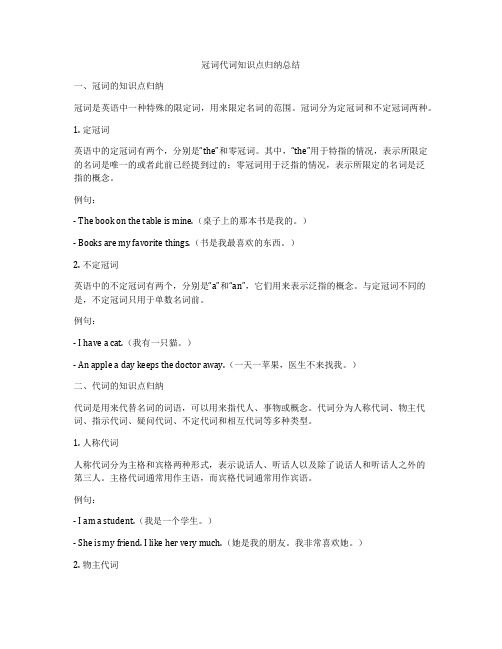
冠词代词知识点归纳总结一、冠词的知识点归纳冠词是英语中一种特殊的限定词,用来限定名词的范围。
冠词分为定冠词和不定冠词两种。
1. 定冠词英语中的定冠词有两个,分别是“the”和零冠词。
其中,“the”用于特指的情况,表示所限定的名词是唯一的或者此前已经提到过的;零冠词用于泛指的情况,表示所限定的名词是泛指的概念。
例句:- The book on the table is mine.(桌子上的那本书是我的。
)- Books are my favorite things.(书是我最喜欢的东西。
)2. 不定冠词英语中的不定冠词有两个,分别是“a”和“an”,它们用来表示泛指的概念。
与定冠词不同的是,不定冠词只用于单数名词前。
例句:- I have a cat.(我有一只猫。
)- An apple a day keeps the doctor away.(一天一苹果,医生不来找我。
)二、代词的知识点归纳代词是用来代替名词的词语,可以用来指代人、事物或概念。
代词分为人称代词、物主代词、指示代词、疑问代词、不定代词和相互代词等多种类型。
1. 人称代词人称代词分为主格和宾格两种形式,表示说话人、听话人以及除了说话人和听话人之外的第三人。
主格代词通常用作主语,而宾格代词通常用作宾语。
例句:- I am a student.(我是一个学生。
)- She is my friend. I like her very much.(她是我的朋友。
我非常喜欢她。
)2. 物主代词物主代词用来表示所属关系,分为形容词性物主代词和名词性物主代词两种形式。
形容词性物主代词一般用在名词的前面作为修饰,而名词性物主代词则直接代替名词。
例句:- This is my book.(这是我的书。
)- This book is mine.(这本书是我的。
)3. 指示代词指示代词用来指示离说话人近或者远的人或事物,分为近指代词和远指代词两种形式。
冠词总结知识点归纳

冠词总结知识点归纳一、冠词的定义冠词是指定名词词义的虚词。
它位于名词之前,有时在其前面可以有形容词或其他修饰词。
冠词的使用是语言中一个非常基本的语法规则,是学习英语的重要一环。
在英语语法中,冠词分为三种:不定冠词a/an,定冠词the和零冠词。
二、不定冠词1. 不定冠词的定义不定冠词有两个形式,即a和an,表示泛指或不特定的人或事物。
a用于辅音开头的词前,an用于元音开头的词前。
2. 不定冠词的使用(1)用在可数名词的单数形式前,泛指一个人或事物。
例:I saw a dog in the street.(2)表示职业、国籍、宗教或宗教信仰的一个人。
例:He is a doctor.(3)表示一种特殊的人或事物。
例:She lived in a small house.3. 注意事项(1)不定冠词的a变成an时,只是音标的问题,而不是词的本身。
(2)a和an本身没有复数形式,也没有限定词的概念。
三、定冠词1. 定冠词的定义定冠词the有三种形式,即普通形式the,音标为[ðə];元音开头名词前的形式the,音标为[ði:];辅音开头连读时的形式the,音标为[ðə]。
定冠词the表示特指,用于特定的人或事物。
2. 定冠词的使用(1)用在特指的可数名词或不可数名词前,表示特定的人或事物。
例:The boy is playing in the garden.(2)用于上文已经提到过的名词前,表示特指。
例:She opened the door and went out.3. 注意事项(1)the没有复数形式,也没有限定词的概念。
(2)the不同于a或an,the并不表示非常特指。
四、零冠词1. 零冠词的定义零冠词指的是没有冠词的情况,即名词前没有任何限定词。
这种情况并不表示名词没有冠词,只是在语法上的规定。
2. 零冠词的使用(1)通常用于不可数名词或复数名词前。
例:She has long hair.(2)用于专有名词前,比如人名、地名、国名等。
冠词语法知识点详解及常见错用分析

冠词语法知识点详解及常见错用分析2023年了,英语作为一门全球通用的语言,它的语法知识点对于每一个学习者来说都是非常重要的。
其中冠词作为重要的语法成分,在英语学习中也是非常重要的,但是很多学生在学习时还存在一些常见的冠词误用,下面是冠词语法知识点和常见错误分析。
一、冠词的概念和基本用法冠词又称限定词,是英语语言中最常见的词之一,用于修饰名词或名词短语。
冠词分为不定冠词和定冠词,不定冠词是指“a/an”,定冠词是指“the”。
不定冠词的用法:1.表示一个人或一件事物中的任何一个,或者表示数量为一的时候,通常用“a/an”来表示;2.用在表示职业、国籍、宗教、学科、乐器、颜色等的名词前面;3.在比较、充当序数词、读数字时同样用“a/an”表达数量。
例如:I saw a dog on the way home.She is an American.There is a red flower on the table.定冠词的用法:1.表示特定的人或物,通常用“the”来表示;2.用在特定的国家、地区、海洋、山脉、河流、群岛等名词前面;3.在说到某件事情的时候,表示上文中已提到的事物。
例如:I want to visit the Great Wall in China.I have read the book you recommended last week.The moon looks round tonight.二、常见冠词误用1.误用不定冠词“a/an”(1)当我们说一些相同物品中的某一个时,不可使用“a/an”。
例如:I saw a students who was smoking in the classroom. (错误)正确句子应该是: I saw a student who was smoking in the classroom.(2) 当我们表示数量时,应该用“a/an”表示一个,而不是用于其他数字。
冠词高考知识点总结
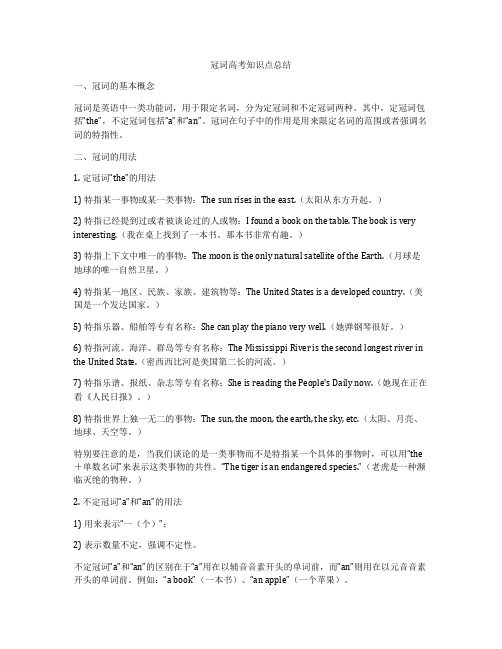
一、冠词的基本概念冠词是英语中一类功能词,用于限定名词,分为定冠词和不定冠词两种。
其中,定冠词包括“the”,不定冠词包括“a”和“an”。
冠词在句子中的作用是用来限定名词的范围或者强调名词的特指性。
二、冠词的用法1. 定冠词“the”的用法1) 特指某一事物或某一类事物:The sun rises in the east.(太阳从东方升起。
)2) 特指已经提到过或者被谈论过的人或物:I found a book on the table. The book is very interesting.(我在桌上找到了一本书。
那本书非常有趣。
)3) 特指上下文中唯一的事物:The moon is the only natural satellite of the Earth.(月球是地球的唯一自然卫星。
)4) 特指某一地区、民族、家族、建筑物等:The United States is a developed country.(美国是一个发达国家。
)5) 特指乐器、船舶等专有名称:She can play the piano very well.(她弹钢琴很好。
)6) 特指河流、海洋、群岛等专有名称:The Mississippi River is the second longest river in the United State.(密西西比河是美国第二长的河流。
)7) 特指乐谱、报纸、杂志等专有名称:She is reading the People's Daily now.(她现在正在看《人民日报》。
)8) 特指世界上独一无二的事物:The sun, the moon, the earth, the sky, etc.(太阳、月亮、地球、天空等。
)特别要注意的是,当我们谈论的是一类事物而不是特指某一个具体的事物时,可以用“the +单数名词”来表示这类事物的共性。
“The tiger is an endangered species.”(老虎是一种濒临灭绝的物种。
冠词知识点总结详细
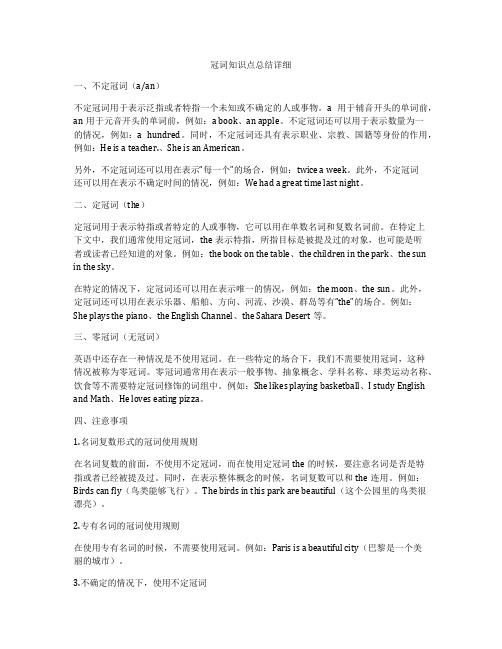
冠词知识点总结详细一、不定冠词(a/an)不定冠词用于表示泛指或者特指一个未知或不确定的人或事物。
a用于辅音开头的单词前,an用于元音开头的单词前,例如:a book、an apple。
不定冠词还可以用于表示数量为一的情况,例如:a hundred。
同时,不定冠词还具有表示职业、宗教、国籍等身份的作用,例如:He is a teacher.、She is an American。
另外,不定冠词还可以用在表示“每一个”的场合,例如:twice a week。
此外,不定冠词还可以用在表示不确定时间的情况,例如:We had a great time last night。
二、定冠词(the)定冠词用于表示特指或者特定的人或事物,它可以用在单数名词和复数名词前。
在特定上下文中,我们通常使用定冠词,the表示特指,所指目标是被提及过的对象,也可能是听者或读者已经知道的对象。
例如:the book on the table、the children in the park、the sun in the sky。
在特定的情况下,定冠词还可以用在表示唯一的情况,例如:the moon、the sun。
此外,定冠词还可以用在表示乐器、船舶、方向、河流、沙漠、群岛等有“the”的场合。
例如:She plays the piano、the English Channel、the Sahara Desert等。
三、零冠词(无冠词)英语中还存在一种情况是不使用冠词。
在一些特定的场合下,我们不需要使用冠词,这种情况被称为零冠词。
零冠词通常用在表示一般事物、抽象概念、学科名称、球类运动名称、饮食等不需要特定冠词修饰的词组中。
例如:She likes playing basketball、I study English and Math、He loves eating pizza。
四、注意事项1.名词复数形式的冠词使用规则在名词复数的前面,不使用不定冠词,而在使用定冠词the的时候,要注意名词是否是特指或者已经被提及过。
冠词代词知识点总结
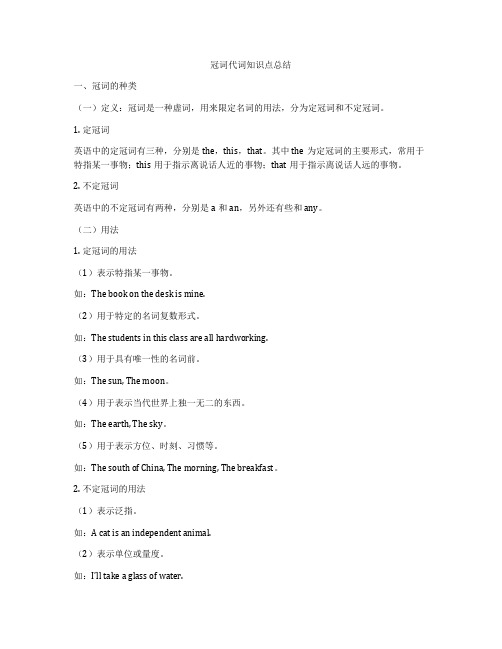
冠词代词知识点总结一、冠词的种类(一)定义:冠词是一种虚词,用来限定名词的用法,分为定冠词和不定冠词。
1. 定冠词英语中的定冠词有三种,分别是the,this,that。
其中the为定冠词的主要形式,常用于特指某一事物;this用于指示离说话人近的事物;that用于指示离说话人远的事物。
2. 不定冠词英语中的不定冠词有两种,分别是a和an,另外还有些和any。
(二)用法1. 定冠词的用法(1)表示特指某一事物。
如:The book on the desk is mine.(2)用于特定的名词复数形式。
如:The students in this class are all hardworking.(3)用于具有唯一性的名词前。
如:The sun, The moon。
(4)用于表示当代世界上独一无二的东西。
如:The earth, The sky。
(5)用于表示方位、时刻、习惯等。
如:The south of China, The morning, The breakfast。
2. 不定冠词的用法(1)表示泛指。
如:A cat is an independent animal.(2)表示单位或量度。
如:I’ll take a glass of water.(3)表示“一会儿”,用于具有表示时间的名词前。
如:I’ll be back in a moment.3. 不定冠词的特殊用法(1)修饰以元音开头的名词时使用an,修饰以辅音开头的名词时使用a。
如:a dog, an apple。
(2)some与any的用法some用于肯定的陈述句中,any用于否定句或疑问句中。
some还用于请求、建议和询问时,表示婉转、委婉。
而any总是用于疑问句和否定句。
如:There is some milk in the fridge.Have you got any money?二、代词(一)定义:代词是用来代替名词的一种词类。
冠词知识点梳理

冠词一.知识点梳理:不定冠词定冠词冠词零冠词(一)不定冠词的用法:1.在叙述时用于第一次提到某人或某物前。
This is a book.2.泛指人或事物的某一类别,以区别于其他种类。
A plane is a machine that can fly.3.泛指某人或某物。
A young man is waiting for you.4.用于表示时间、速度、价格等意义的名词前,有“每一”的意思,相当于every. We have five lessons a week.5.用在某些物质名词或抽象名词前,表示“一阵,一份,一类,一场”等。
There will be a strong wind in South China.6.用于可视为一个整体的两个名词前。
a knife and fork(二)零冠词的用法:口诀:下列情况应免冠,代词限定名词前;专有名词不可数,学科球类三餐饭;复数名词表泛指,两节星期月份前;颜色语种和国名,称呼习语及头衔。
以上口诀主要概括了一般应“免冠”的几种情况,即:①名词前已有作定语用的this、that、some、any、my等限定词。
①专有名词和不可数名词前。
①表示学科的(如:maths、Chinese、physics)名词前。
①球类活动的名词前及三餐总称前。
①复数名词表示泛指(一类人或事)时。
①节日、季节、星期、月份前。
①表示颜色(如:It's red / yellow.)、语种(如:speak English/Japanese)和国家的非全称名词(如:We live in China. They come from America.)。
①在称呼或表示头衔的名词前。
①某些习惯短语中(如:in bed、go to school等)。
(三)定冠词的用法口诀:特指双熟悉,上文已提及;世上独无二,序数最高级;某些专有名,习语及乐器。
以上口诀归纳了用定冠词的一般情况,即:①特指某些人或物①谈话双方都熟悉的人或事①上文已经提到的人或事①世界上独一无二的事物前①序数词回形容词最高级前①某些专有名词前①一些习惯短语(如:in the day等)中和乐器前(如:play the violin / piano)。
英语冠词常考知识点
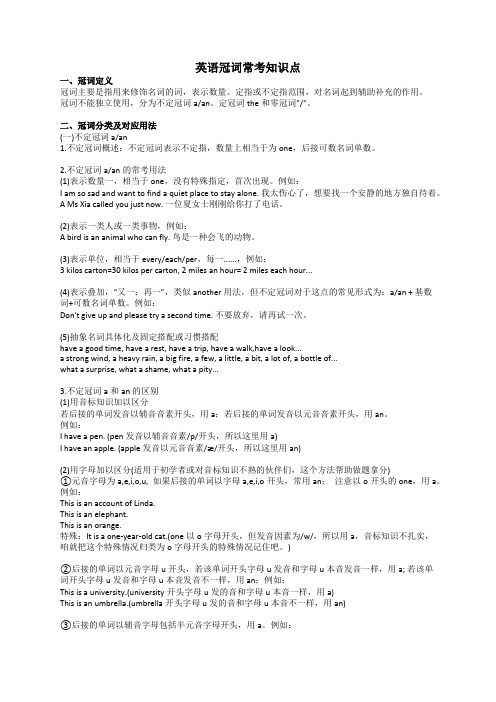
英语冠词常考知识点一、冠词定义冠词主要是指用来修饰名词的词,表示数量、定指或不定指范围,对名词起到辅助补充的作用。
冠词不能独立使用,分为不定冠词a/an、定冠词the和零冠词"/"。
二、冠词分类及对应用法(一)不定冠词 a/an1.不定冠词概述:不定冠词表示不定指,数量上相当于为one,后接可数名词单数。
2.不定冠词a/an的常考用法(1)表示数量一,相当于one,没有特殊指定,首次出现。
例如:I am so sad and want to find a quiet place to stay alone. 我太伤心了,想要找一个安静的地方独自待着。
A Ms Xia called you just now. 一位夏女士刚刚给你打了电话。
(2)表示一类人或一类事物,例如:A bird is an animal who can fly. 鸟是一种会飞的动物。
(3)表示单位,相当于every/each/per,每一......,例如:3 kilos carton=30 kilos per carton, 2 miles an hour= 2 miles each hour...(4)表示叠加,“又一;再一”,类似another用法,但不定冠词对于这点的常见形式为:a/an + 基数词+可数名词单数。
例如:Don't give up and please try a second time. 不要放弃,请再试一次。
(5)抽象名词具体化及固定搭配或习惯搭配have a good time, have a rest, have a trip, have a walk,have a look...a strong wind, a heavy rain, a big fire, a few, a little, a bit, a lot of, a bottle of...what a surprise, what a shame, what a pity...3.不定冠词a和an的区别(1)用音标知识加以区分若后接的单词发音以辅音音素开头,用a;若后接的单词发音以元音音素开头,用an。
高考冠词知识点大全
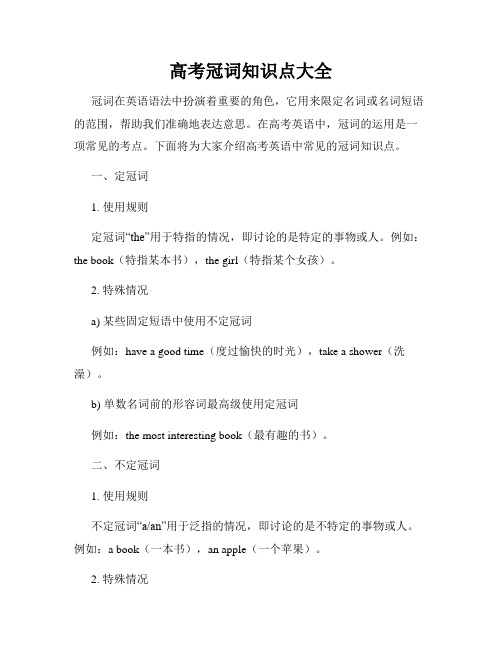
高考冠词知识点大全冠词在英语语法中扮演着重要的角色,它用来限定名词或名词短语的范围,帮助我们准确地表达意思。
在高考英语中,冠词的运用是一项常见的考点。
下面将为大家介绍高考英语中常见的冠词知识点。
一、定冠词1. 使用规则定冠词“the”用于特指的情况,即讨论的是特定的事物或人。
例如:the book(特指某本书),the girl(特指某个女孩)。
2. 特殊情况a) 某些固定短语中使用不定冠词例如:have a good time(度过愉快的时光),take a shower(洗澡)。
b) 单数名词前的形容词最高级使用定冠词例如:the most interesting book(最有趣的书)。
二、不定冠词1. 使用规则不定冠词“a/an”用于泛指的情况,即讨论的是不特定的事物或人。
例如:a book(一本书),an apple(一个苹果)。
2. 特殊情况a) 当名词以元音音素开头时,使用“an”作为不定冠词;当名词以辅音音素开头时,使用“a”作为不定冠词。
例如:an hour(一个小时),a dog(一只狗)。
三、零冠词(不使用冠词)1. 一般规则a) 泛指的名词复数形式一般不使用冠词。
例如:children like playing(孩子们喜欢玩耍)。
b) 名词前有形容词最高级或序数词时,一般不使用冠词。
例如:best friend(最好的朋友),first prize(第一名)。
2. 特殊情况a) 用在某些固定短语中。
如:go to bed(上床睡觉),by bus(乘坐公交车)。
b) 某些名词具有固定的概念,不使用冠词。
如:school(学校),home(家)。
四、冠词的错误使用1. 不必要的冠词错误:I want to the park.正确:I want to go to the park.2. 缺少冠词错误:I saw car accident yesterday.正确:I saw a car accident yesterday.3. 错误的冠词形式错误:She is an European.正确:She is a European.总结以上是高考英语中关于冠词的常见知识点。
冠词的用法总结知识点

冠词的用法总结知识点一、不定冠词(a/an)的用法1. 不定冠词(a/an)用于泛指某物或某人在英语中,不定冠词(a/an)用于泛指某个物品或者某个人。
例如:- There is a dog in the yard.(院子里有一只狗)- She has an interesting book.(她有一本有趣的书)2. 不定冠词(a/an)用于表示某类事物中的一个不定冠词(a/an)也可以用于表示某一类事物中的一个。
例如:- She is a doctor.(她是一名医生)- I need a pen.(我需要一支笔)3. 不定冠词(a/an)用于表示数量为一的事物不定冠词(a/an)还可以用于表示数量为一的事物。
例如:- I have a car.(我有一辆车)- She has a brother.(她有一个哥哥)二、定冠词(the)的用法1. 定冠词(the)用于特指某物或某人定冠词(the)用于特指某个已知的物品或者人。
例如:- The dog in the yard is mine.(院子里的那只狗是我的)- The book on the table is interesting.(桌子上的那本书很有趣)2. 定冠词(the)用于表示唯一的事物当我们提到的事物是唯一的时候,通常会使用定冠词(the)。
例如:- The sun rises in the east.(太阳从东方升起)- The earth is round.(地球是圆的)3. 定冠词(the)用于表示已知的事物当我们所讨论的事物是已知的时候,也会使用定冠词(the)。
例如:- This is the book I was looking for.(这就是我在找的那本书)- Have you seen the movie "Titanic"?(你看过"泰坦尼克"这部电影吗?)三、零冠词的用法1. 零冠词用于表示泛指情况有些名词并不需要用冠词来修饰,这种情况下就使用零冠词。
英语冠词知识点简单总结

英语冠词知识点简单总结一、定冠词(the)的用法1. 特指某一事物或某一类事物The sun is shining.(太阳在照耀。
)The dog in the garden is barking.(花园里的那只狗在叫。
)2. 特指前面提到的事物I saw a bird. The bird was singing beautifully.(我看到了一只鸟。
那只鸟唱得很美。
)3. 特指世界上独一无二的事物The earth revolves around the sun.(地球绕着太阳转。
)4. 用在一些固定搭配中the United States(美国)the United Kingdom(英国)the Great Wall(长城)5. 特指上下文中已经提到的名词I bought a new car. The car is very fast.(我买了一辆新车。
这辆车非常快。
)6. 用在姓氏的复数形式前The Browns are moving to a new house.(布朗一家将搬到新房子里。
)二、不定冠词(a、an)的用法1. 表示一种或一类事物I want to buy a car.(我想买一辆车。
)2. 在表示身份、职业或国籍的名词前使用She is a student.(她是一名学生。
)3. 当某人或某物第一次被提及时I met a girl at the party.(我在派对上遇到了一个女孩。
)4. 在表示数量的名词前使用She has a lot of friends.(她有很多朋友。
)三、零冠词的使用1. 可数名词的复数形式表示泛指Dogs are good companions.(狗是好伴侣。
)2. 不可数名词表示泛指Water is essential for life.(水对生命至关重要。
)3. 物质名词表示泛指I like coffee.(我喜欢咖啡。
)4. 用在专有名词、称谓和称呼语前London is the capital of England.(伦敦是英格兰的首都。
英语冠词的知识点总结
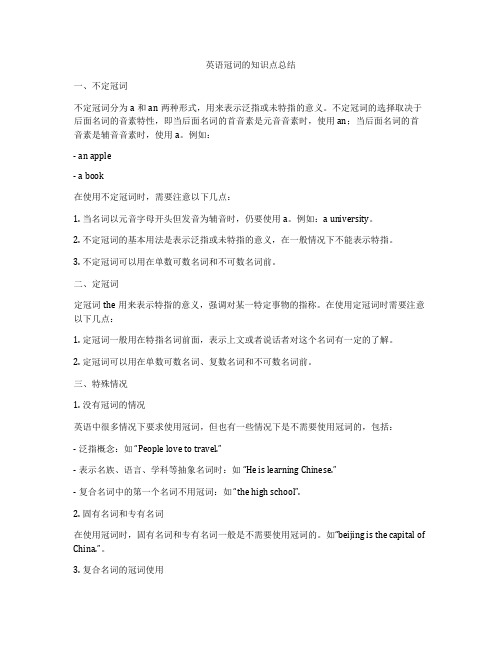
英语冠词的知识点总结一、不定冠词不定冠词分为a和an两种形式,用来表示泛指或未特指的意义。
不定冠词的选择取决于后面名词的音素特性,即当后面名词的首音素是元音音素时,使用an;当后面名词的首音素是辅音音素时,使用a。
例如:- an apple- a book在使用不定冠词时,需要注意以下几点:1. 当名词以元音字母开头但发音为辅音时,仍要使用a。
例如:a university。
2. 不定冠词的基本用法是表示泛指或未特指的意义,在一般情况下不能表示特指。
3. 不定冠词可以用在单数可数名词和不可数名词前。
二、定冠词定冠词the用来表示特指的意义,强调对某一特定事物的指称。
在使用定冠词时需要注意以下几点:1. 定冠词一般用在特指名词前面,表示上文或者说话者对这个名词有一定的了解。
2. 定冠词可以用在单数可数名词、复数名词和不可数名词前。
三、特殊情况1. 没有冠词的情况英语中很多情况下要求使用冠词,但也有一些情况下是不需要使用冠词的,包括:- 泛指概念:如“People love to travel.”- 表示名族、语言、学科等抽象名词时:如“He is learning Chinese.”- 复合名词中的第一个名词不用冠词:如“the high school”.2. 固有名词和专有名词在使用冠词时,固有名词和专有名词一般是不需要使用冠词的。
如“beijing is the capital of China.”。
3. 复合名词的冠词使用在英语中,复合名词的冠词使用需要根据具体情况进行判断。
通常要根据复合名词的意义来决定是否需要给复合名词的每个部分都加冠词。
例如:“the United States”.四、常见错误1. 误删冠词在使用冠词时,有时候会忽略冠词的使用,导致句子理解错误。
例如:“She is student”应该是“She is a student”.2. 重复不必要的冠词在使用冠词时,有时候会重复使用冠词,导致句子不通顺。
冠词语法知识点总结

冠词语法知识点总结冠词的基本用法包括限定名词、表示特指和泛指,以及表示数量或类别。
下面我们将详细介绍冠词的用法和规则。
一、不定冠词(a/an)的用法1. 不定冠词用来表示泛指,即没有特定的名词。
例如:- I saw a dog in the park yesterday.(我昨天在公园里看到一只狗。
)- She bought an umbrella because it was raining.(因为下雨,她买了一把伞。
)2. 不定冠词用在单数可数名词前面,而不用在复数名词和不可数名词前面。
例如:- I need a book to read.(我需要一本书来读。
)- She has a lot of friends.(她有很多朋友。
)3. 不定冠词的形式根据名词的发音来决定。
当名词以辅音音素开头时使用“a”,以元音音素开头时使用“an”。
例如:- a book(一本书)- an apple(一个苹果)4. 不定冠词可以用在表示职业、宗教、国籍、语言、颜色等名词前面。
例如:- She is a doctor.(她是一名医生。
)- He is an American.(他是美国人。
)- She speaks a little French.(她会说一点法语。
)5. 不定冠词可以用来表示数量为“一个”。
例如:- She bought a dozen eggs.(她买了一打鸡蛋。
)二、定冠词(the)的用法1. 定冠词用来表示特指,即特定的名词或已知的名词。
例如:- The dog in the park is mine.(公园里那只狗是我的。
)- Have you seen the movie I recommended?(你看过我推荐的那部电影吗?)2. 定冠词可以用在单数名词和复数名词前面,也可以用在不可数名词前面。
例如:- The book on the table is mine.(桌子上的那本书是我的。
英语高考冠词知识点归纳
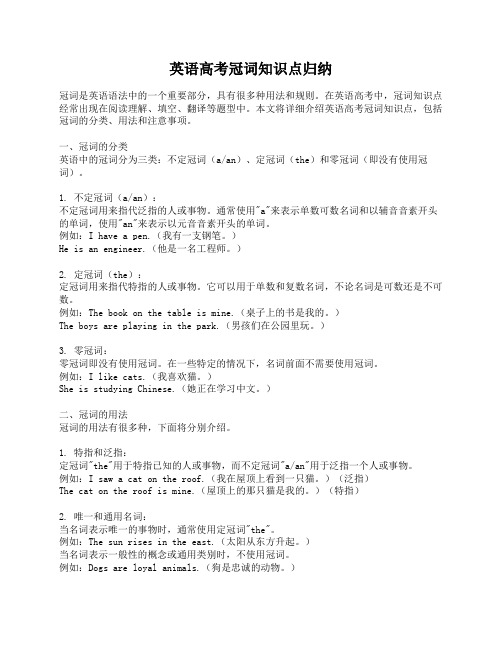
英语高考冠词知识点归纳冠词是英语语法中的一个重要部分,具有很多种用法和规则。
在英语高考中,冠词知识点经常出现在阅读理解、填空、翻译等题型中。
本文将详细介绍英语高考冠词知识点,包括冠词的分类、用法和注意事项。
一、冠词的分类英语中的冠词分为三类:不定冠词(a/an)、定冠词(the)和零冠词(即没有使用冠词)。
1. 不定冠词(a/an):不定冠词用来指代泛指的人或事物。
通常使用"a"来表示单数可数名词和以辅音音素开头的单词,使用"an"来表示以元音音素开头的单词。
例如:I have a pen.(我有一支钢笔。
)He is an engineer.(他是一名工程师。
)2. 定冠词(the):定冠词用来指代特指的人或事物。
它可以用于单数和复数名词,不论名词是可数还是不可数。
例如:The book on the table is mine.(桌子上的书是我的。
)The boys are playing in the park.(男孩们在公园里玩。
)3. 零冠词:零冠词即没有使用冠词。
在一些特定的情况下,名词前面不需要使用冠词。
例如:I like cats.(我喜欢猫。
)She is studying Chinese.(她正在学习中文。
)二、冠词的用法冠词的用法有很多种,下面将分别介绍。
1. 特指和泛指:定冠词"the"用于特指已知的人或事物,而不定冠词"a/an"用于泛指一个人或事物。
例如:I saw a cat on the roof.(我在屋顶上看到一只猫。
)(泛指)The cat on the roof is mine.(屋顶上的那只猫是我的。
)(特指)2. 唯一和通用名词:当名词表示唯一的事物时,通常使用定冠词"the"。
例如:The sun rises in the east.(太阳从东方升起。
冠词必考知识点总结

冠词必考知识点总结一、冠词的定义冠词是一种虚词,用来限定名词的范围。
英语中的冠词有两种,分别是定冠词和不定冠词。
定冠词包括“the”,不定冠词包括“a”和“an”。
二、冠词的分类和用法1.不定冠词不定冠词包括“a”和“an”,用来表示泛指或不特指的概念。
具体用法如下:(1)用“a”表示单数可数名词,用“an”表示以元音字母开头的单数可数名词。
例如:a book(一本书),an apple(一个苹果)(2)不定冠词只能用在单数名词前,不能用在复数名词前,也不能用在不可数名词前。
例如:a book(一本书,书是可数名词单数),books(书是可数名词复数,不能用不定冠词),water(水是不可数名词,不能用不定冠词)(3)当表示职业、国籍、宗教、颜色、材料等意义时,也要用不定冠词。
例如:She is a teacher.(她是一名老师。
)2.定冠词定冠词指特指的概念,在名词前面提到的人或事物必须是双方都知道的。
具体用法如下:(1)用于特指的名词前。
例如:the book on the table(桌子上的那本书)(2)用于复数名词前。
例如:the boys(那些男孩们)(3)用于表示世界、山脉、河流、海峡、天体等专有名词前。
例如:the earth(地球),the Yellow River(黄河)3.零冠词有些情况下,名词前面不用冠词,称为零冠词。
具体情况如下:(1)用在名词的复数形式、抽象名词以及专有名词前。
例如:birds(鸟),honesty(诚实),Mary(玛丽)(2)用在一些表示普遍性、概念的名词前。
例如:Happiness is the source of success.(幸福是成功的源泉。
)三、冠词的特殊用法1.表示类别在英语中,当我们用冠词表示某种类别时,有时候需要用定冠词,有时候需要用不定冠词,这取决于名词所表示的概念是否为特指。
具体规则如下:(1)当表示某个类别时,用定冠词。
- 1、下载文档前请自行甄别文档内容的完整性,平台不提供额外的编辑、内容补充、找答案等附加服务。
- 2、"仅部分预览"的文档,不可在线预览部分如存在完整性等问题,可反馈申请退款(可完整预览的文档不适用该条件!)。
- 3、如文档侵犯您的权益,请联系客服反馈,我们会尽快为您处理(人工客服工作时间:9:00-18:30)。
冠词一、不定冠词1. 不定冠词a和an,一般用来修饰单数可数名词。
a用在发音以辅音音素的名词之前,an则用在发音以元音音素的名词之前。
如:a student,an orange。
注意:1)以元音字母U字母开头的词:an umbrella/ unhappy family/ unusual childa useful book/ university/ UFO/ uniform2)以辅音字母H字母开头的词:An honest boy/ hourA history book/ horse3)以元音字母E字母开头的词:English/ egg European4)以元音因素开头的字母: m/ f/ h/ x/ 8/ sEg: There is an “m” in the word “mouth”.The “h” in the word “hour” is not pronounced.2. 不定冠词指表示某一类人或某事物中的任何一个,第一次提到某人或某物时,1) 用于可数名词单数前,表示某一类人或事物(相当于 any+n.)Eg: A horse is a useful animal.A student should study hard.2) 泛指某一类人或事物中的一个Eg:I am a student. / Give me a pen, please.3) 指某人或某物,但不具体说明何人或何物。
Eg: A boy is waiting for you.Last week we worked in a factory.4) 表示数量,有“一个”的意思。
Eg: I have a dog. / Have a cup of tea, please.5) 表示单位,相当于“每”的意思。
Eg: They worked eight hours a day.The train can go 100 kilometers an hour.6)用于固定词组中。
have a rest (break,look,,try, cold, fever, headache), take a walk, in amoment,in a minute, once upon a time, twice a month, four times an hour ,a little , a few , a lot of,a great many ,as a rule ,in a hurry , in a word ,in a short while (不久),after a while ,have a good time , (say) with a smile(speak) in a low voice, have a word with sb,take an active part in 积极参加二、定冠词的用法定冠词the可以和一个名词连用,来表示某个或某些特定的人或东西。
Give me the book ( on the top shelf)We must catch the next bus.(1)特指双方都明白的人或物:Take the medicine.把药吃了。
What’s in the paper ( on the radio)(2)上文提到过的人或事:He bought a house.I’ve been to the house.他买了幢房子。
我去过那幢房子。
(3)指世上独一物二的事物:the sun,the sky,the moon,the earth,the world/ the universeIn space 在太空(4)与单数名词连用表示一类事物:如:the dollar 美元;the fox 狐狸The horse is a useful animal. (表类别与其它类别相区别)A horse is a useful animal. (类别中的任何一个或具体的一个例子)或与形容词或分词连用,表示一类人:如:the rich 富人;the living 生者。
The old/ sick/ young/ blind/ sick (5)用在序数词和形容词最高级,及形容词only,very,same,表方向的名词等前面:Eg: the first time, the last lesson, the longest river, on the leftThat’s the very thing I’ve been looking for. 那正是我要找的东西。
注意:当序数词表名次,在句中作表语或状语时,通常不加冠词Eg: I am second in the English contest.(表语)George arrived first. (状语)序数词表“又一”时,前面常不加定冠词Eg: He lost his way for a second time yesterday.当表示方位的名词做副词时,不加定冠词Eg: I’m thinking of going south. / from east to west(6)与复数名词连用,指整个群体:They are the teachers of this school.指全体教师)They are teachers of this school. (指部分教师)(7)表示所有,相当于物主代词,用在表示身体部位的名词前:She caught me by the arm…… 她抓住了我的手臂。
She patted the boy on the head.(8)用在某些由普通名词构成的国家名称、机关团体、阶级、等专有名词前:the People’s Republic of China 中华人民共和国 the United States 美国the Great Wall 长城 the Shanghai Railway Stationthe No.1 Middle School(9)用在表示乐器的名词之前:Eg: She is playing the piano.她正在弹钢琴。
(violin, guitar, triangle(三角铁), drum, recorder (竖笛))注意:在表示具体的器物或表示课程时,不加theEg: He bought a pian o last month.She taught piano in the school.(10)用在姓氏的复数名词之前,表示一家人:(在句中做主语时,谓语动词用复数)Eg: The Greens are watching TV now. 格林一家人(或格林夫妇)(11) 在江河、海洋、山脉、群岛的名称前,如the Yellow River , the East China 东海; the West Lake 西湖the Tianshan Mountains 天山(12) 某些建筑物名词前,如the Summer Palace.(13) 在报纸、杂志、旅馆、经典等名词前,如the People′s Daily.(14)用于自然现象前 Don’t stand in the rain.(15)用在惯用语中:in the day在白天,in the morning (afternoon,evening),the day after tomorrow, the day before yesterday,the nextmorning,in the sky (water,field,country),in the end最终,in the distance 在远处,in the middle (of)在...中间,inthe center of 在.....中心on the whole总的来说,by the way顺便说一下,have the flu流感hit sb in the face/ on the head, pay by the hour四、零冠词的用法(1)抽象名词, 物质名词表示一般概念时;专有名词前(人名,地名)通常不加冠词;Eg: England,Mary,water, happinessFailure is the mother of success.失败乃成功之母。
Man cannot live without water.人离开水就无法生存。
(2)在季节、月份、节日、假日、日期、星期等表示时间的名词之前,不加冠词;Eg: We go to school from Monday to Friday. 我们从星期一到星期五都上课。
It is hot in summer.New Year’s Day 元旦 Tree Planting Day植树节the Spring Festival 春节 the Mid-Autumn Day/ Festival注意:如特指在某个季节里,需用定冠词During the summer/ the spring of 1984(3)在称呼或表示官衔,职位的名词前不加冠词(职位是唯一的);Eg: Dad, let’s go to see a film.He was president of the Republic at that time.He is captain of the team. 球队队长。
(monitor)注意:当职位不是唯一的,前面一般不加不定冠词Eg: She is a teacher of geography in our universit y.当出现this, that,my, these, some, any, no, every, each 及人名的所有格时,前面一般不加不定冠词Eg: The Xiao Li’s mother is a nurse. ( )Xiao Li’s mother is a nurse. ( )(4)在三餐,不加冠词;have breakfast/lunch/ supper/ dinner注意:meal 泛指一顿饭时,要用不定冠词一日三餐前有修饰语,也加不定冠词Eg: We had a wonderful lunch./ He had a big meal.特指时,用theEg: The supper (I had last night) was wonderful.(5) 球类运动和娱乐运动(棋牌)的名称前,不加冠词;Eg: play chess, tennis,basketball, volleyball, table tennis(6) 表学科,不加冠词;Eg: maths, physics, history, English, geography, biology, chemistry, music, P.E, politics(7) 当by 与火车等交通工具连用,表示一种方式时,中间无冠词;Eg: by bus,by train;注意: In a car, on a bus, take the underground(8)当两个或两个以上名词并用时,常省去冠词;I can’t write without pen or pencil.没有钢笔和铅笔,我就写不了字。
